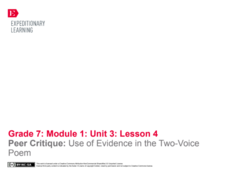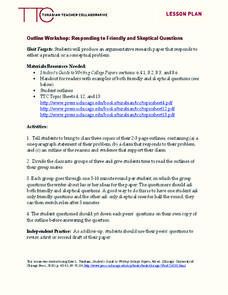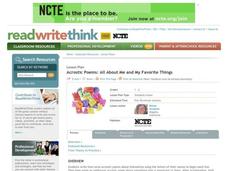EngageNY
Peer Critique: Historical Accuracy of Ideas and Vocabulary
Promote collaboration in the classroom with a historical fiction instructional activity. Fourth graders partner up and read the other's narrative to give feedback on vocabulary choice and the accuracy of historical information. After...
EngageNY
Writing Dialogue: Revising Historical Narrative Drafts to Add Dialogue
Young writers have written, revised, and peer-edited their historical fiction narratives by the 10th lesson plan in a language arts unit. Fourth graders finally combine their revision notes to create a second draft. The double-spaced...
Michigan Association of Intermediate School Administrators
Persuasive Essay: Grade 5
Improve your fifth graders' persuasive writing skills in four weeks. Working independently, in peer editing groups, and with instruction, writers work over the 17 sessions to craft an argumentative essay. They craft a well-organized...
EngageNY
Peer Critique: Use of Evidence in the Two-Voice Poem
Peer editors review critique expectations before offering feedback on each other's two-voice poems. They record their feedback on peer critique recording forms, and then begin revising their poems.
EngageNY
Planning for Writing: Introduction and Conclusion of a Literary Argument Essay
After completing three body paragraphs of an argument essay about life's rules to live by from Bud, Not Buddy Christopher Paul Curtis, it's time to begin writing the introduction and conclusion. Independently, pupils draft the final two...
McGraw Hill
Writing Prompts, Student Rubrics, and Sample Responses
Whether you are teaching mainstream, advanced, or intervention language arts classes, you will find something helpful in a thorough writing packet. It includes prompts, rubrics, responses, helpful hints, graphic organizers, and many...
K20 LEARN
Who Am I? Creating And Editing Descriptive Writing
With descriptive writing, the pleasure is in the details. Young writers learn how to add sensory details to a paragraph about themselves. They read a short paragraph and identify the sensory details used. After revising their draft...
EngageNY
Reviewing Conventions and Editing Peers’ Work
Encourage young writers to edit text based on conventions. After reviewing the conventions, fourth graders watch a teacher demonstrate how to revise a paragraph for correct spelling, capitalization, punctuation, or dialogue. Then, pairs...
EngageNY
Peer Critique for Organization and Style
Put another set of eyes on your class's historical fiction narratives with one of the final lessons in the unit. Fourth graders use feedback from their peers to annotate their drafts for revision, particularly their bold beginnings and...
Literacy Design Collaborative
Identifying Points of View through Character Responses in R.J. Palacio's "Wonder"
Readers examine the book Wonder by R.J. Palacio to determine how characters respond differently to situations and events. Readers annotate and analyze the text and carry out group discussion using accountable talk. They work in small...
Turabian Teacher Collaborative
Outline Workshop: Responding to Friendly and Skeptical Questions
Answering questions is the best way to hone and revise your argument. Foster receptive writers with a workshop activity that promotes peer editing and argumentative writing skills. Given lists of both friendly and skeptical questions,...
National Council of Teachers of English
Acrostic Poems: All About Me and My Favorite Things
Budding poets create two acrostic poems, one for their name and another using a word of their choice. Over the course of five days, scholars compose, revise, publish, and share their work with their peers.
EngageNY
Grade 9 ELA Module 2, Unit 2, Lesson 12
Ninth graders demonstrate their understanding of a central idea in Oedipus the King with a mid-unit writing assessment. Writers formulate a claim about the connection between prophecy and Oedipus's actions and craft an in-class essay...
Houghton Mifflin Harcourt
Give It All You’ve Got!: Challenge Activities (Theme 2)
Explore ways to make research and writing more interesting. The first in a series of three challenge activities designed to accompany Theme 2: Give It All You've Got involve creating sports cards, designing cereal boxes, and using other...
Lerner Publishing
Teaching Folklore
Wonderful worksheets and activities complementing six sequential lessons are what you'll find in this unit on folklore. Pupils create folktales using literary devices and included story starters, compare and contrast different folklores,...
















